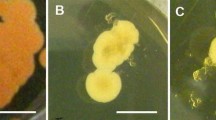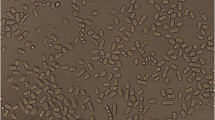Abstract
To screen yeast with high sugar tolerance and evaluate their stress tolerance, six yeast strains were selected from 17 stored honey samples. The species were identified through 26S rRNA sequencing. Their stress tolerance was determined via the Durham fermentation method and ethanol production ability was determined via flask fermentation. The results demonstrated that all the six strains were Zygosaccharomyces mellis. Their sugar, ethanol, and acid tolerance ranges were 500–700 g/L, 10–12% (v/v), and pH 2.5–4.5, respectively. The SO2 tolerance was 250 mg/L. Among the six strains, 6-7431 had the best stress tolerance with sugar tolerance of 700 g/L, ethanol tolerance of 12% (v/v), and acid tolerance of pH 2.5. Furthermore, the strain of 6-7431 had the highest percentage of ethanol production at the same initial sugar content as the other strains. Therefore, the selected six yeast strains would be promising fermentation yeasts for wine-making, ethanol production, or other fermentation purposes.
Similar content being viewed by others
References
Vásquez Castillo JA, Laguado JA, López J, Gil NJ. New sources and methods to isolate vinasse-tolerant wild yeasts efficient in ethanol production. Ann. Microbiol. 66: 187–195 (2016)
Meijnen JP, Randazzo P, Foulquié MR, Brink J, Vandecruys P, Stojiljkovic M, Dumortier F, Zalar P, Boekhout T, Gunde-Cimerman N, Kokošar J, Štajdohar M, Curk T, Petroviè U, Thevelein JM. Polygenic analysis and targeted improvement of the complex trait of high acetic acid tolerance in the yeast Saccharomyces cerevisiae. Biotechnol. Biofuel. 9, 5 (2016)
Kłosowski G, Mikulski D, Macko D, Miklaszewska B, Kotarska K, Czupryñski B. Influence of various yeast strains and selected starchy raw materials on production of higher alcohols during the alcoholic fermentation process. Eur. Food. Res. Technol. 240: 233–242 (2015)
Qiu JX, Qu JY, Lin DX, He TF, Peng Y. The strain identification of Chinese honey and Italian honey. J. Bee 1: 10–11 (2015)
Qi XH, Wang X, Lin J, Zhu JF, Luo Y, Sun WJ. Screening and identification of osmophilic yeast and studies on its capacity of producing polyols. Food Ferment. Ind. 40: 16–21 (2014)
Zhao S, Li P, Wang Q. Breeding of high-sugar-tolerant yeast and application. J. Anhui Agr. Sci. 38: 4801–4803 (2010)
Shen YP, Zhang ZJ. Selection of high temperature and high sugar producing bacteria by GS. J. Hunan Univ. Sci. Eng. 35: 43–45 (2014)
Tikka C, Osuru HP, Atluri N, Raghavulu PCV, Kumar N, Mannur IS, Prasad UV, Aluru S, Varma K, Bhaskar M. Isolation and characterization of ethanol tolerant yeast strains. Bioinformation 9: 431–425 (2013)
Xu XL, Feng GL, Liu HW, Li XF, Zhao GL, Xiao XL. Isolation, identification and control of osmophilic spoilage yeasts in sweetened condensed milk. Afr. J. Microbiol. Res. 8: 1032–1039 (2014)
Osho A. Ethanol and sugar tolerance of wine yeasts isolated from fermenting cashew apple juice. Afr. J Biotechnol. 4: 660–662 (2005)
Gupta N, Dubey A, Tewair L. High efficiency alcohol tolerant Saccharomyces isolates of Phoenix dactylifera for bioconversion of sugarcane juice into bioethanol. J. Sci. Ind. Res. India 68: 401–405 (2009)
Pallmann CL, Brown JA, Olineka TL, Cocolin L, Mills D, Bisson L. Use of WL medium to profile native flora fermentations. Am. J. Enol. Viticult. 52: 198–203 (2001)
Park WK, Yang JW, Kim HS. Identification of novel genes responsible for salt tolerance by transposon mutagenesis in Saccharomyces cerevisiae. J. Ind. Microbiol. Biot. 42: 567–575 (2015)
Cheng C, Alamrio MP, Kao KC. Genome shuffling to generate recombinant yeasts for tolerance to inhibitors present in lignocellulosic hydrolysates. Biotechnol. Lett. 37: 2193–2220 (2015)
Snoek T, Nicolino MP, den Bremt SV, Mertens S, Saels V, Verplaetse A, Steensels J, Verstrepen KJ. Large-scale robot-assisted genome shuffling yields industrial Saccharomyces cerevisiae yeasts with increased ethanol tolerance. Biotechnol. Biofuel. 8: 1–19 (2015)
Tamura K, Stecher G, Peterson D, Filipski A, Kumar S. MEGA6: Molecular evolutionary genetics analysis Version 6.0. Mol. Biol. Evol. 30: 2725–2729 (2013)
Gasmalla MA, Yang RJ, Nikoo M, Man S. Production of ethanol from Sudanese sugar cane molasses and evaluation of its quality. J. Food Process. Technol. (2012)
Lam FH, Ghaderi A, Fink GR, Stephanopoulos G. Engineering alcohol tolerance in yeast. Science 346: 71–75 (2014)
Alper H, Moxley J, Nevoigt E, Fink GR, Stephanopoulos G. Engineering yeast transcription machinery for improved ethanol tolerance and production. Science 314: 1565–1568 (2006)
Ma C, Wei XW, Sun CH, Zhang F, Xu JR, Zhao XQ, Bai FW. Improvement of acetic acid tolerance of Saccharomyces cerevisiae using a zinc-finger-based artificial transcription factor and identification of novel genes involved in acetic acid tolerance. Appl. Microbiol. Biot. 99: 2441–2449 (2015)
Santos J, Sousa MJ, Cardoso H, Inácio J, Silva S, Spencer-Martins I, Leão C. Ethanol tolerance of sugar transport, and the rectification of stuck wine fermentations. Microbiology 154: 422–430 (2008)
Yang Y, Xu YW, Xue JX, Liu YL. Validate the identification effect of WL nutrient agar on wine yeast. J. Microbiol. 27: 75–78 (2007)
Giuliani A, Pirri G, Nicoletto SF. Antimicrobial peptides: An overview of a promising class of therapeutics. Cent. Eur. J. Biol. 2: 1–33 (2007)
Kurtzman CP, Robnett CJ. Identification and phylogeny of ascomycetous yeasts from analysis of nuclear large subunit (26S) ribosomal DNA partial sequences. A. Van. Leeuw. J. Microb. 73: 331–371 (1998)
Shi Y, Zhang LZ, Zeng ZJ, Wang ZL, Yang WY. Isolation, identification of honey yeast for sapium discolor mead and application. J. Chinese Inst. Food Sci. Tech. 13: 197–204 (2013)
Yu XF, Li XS, Li ZJ. Angel about temperature tolerant alcohol active dry yeast application in the China. Liquor Mak. Sci. Tech. 29: 57–59 (2002)
de Nadal E, Ammerer G, Posas F. Controlling gene expression in response to stress. Nat. Rev. Genet. 12: 833–845 (2011)
Wang B, Zhang GZ, Lu FP, Du LX. Study on the breeding of saccharonyces cerevisiae of high alcohol gravity. J. Tianjin Univ. Light Ind. 3: 33–36 (2001)
Chen JF, Guo WJ, Hu HJ. Separation and properties determination of an acid resistant yeast. China Brewing 32: 39–42 (2013)
Luo HB, Li GH. Study of screen for the acid-proof yeast fungus. J. Sichuan Univ. Sci. Eng. 17: 151–154 (2004)
Li Z, Han BZ, Chen JY, Li SS, Chen C. Study on fermentation characteristics of three excellent Saccharomyces cerevisiae strains. China Brewing 19: 10–12 (2008)
GB/T2760-2014, Hygienic standards for uses of food additives[S]. Standards Press of China, Beijing, China. pp. 17–18 (2015)
Author information
Authors and Affiliations
Corresponding author
Rights and permissions
About this article
Cite this article
Liu, G., Tao, C., Zhu, B. et al. Identification of Zygosaccharomyces mellis strains in stored honey and their stress tolerance. Food Sci Biotechnol 25, 1645–1650 (2016). https://doi.org/10.1007/s10068-016-0253-x
Received:
Revised:
Accepted:
Published:
Issue Date:
DOI: https://doi.org/10.1007/s10068-016-0253-x




